新概念英语第三册 Lesson 12 Life on a desert island 讲义
文档属性
| 名称 | 新概念英语第三册 Lesson 12 Life on a desert island 讲义 | 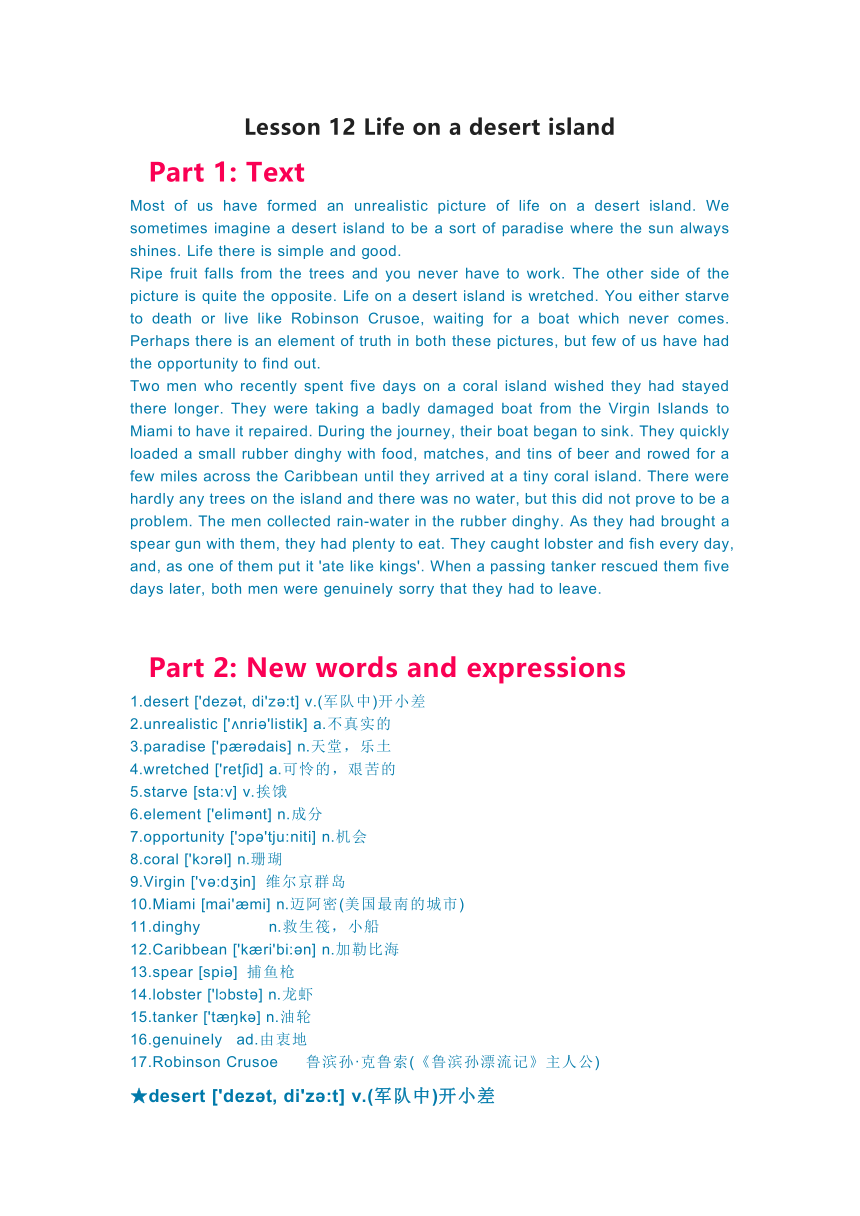 | |
| 格式 | docx | ||
| 文件大小 | 25.4KB | ||
| 资源类型 | 教案 | ||
| 版本资源 | 新概念英语 | ||
| 科目 | 英语 | ||
| 更新时间 | 2023-09-24 22:20:28 | ||
图片预览

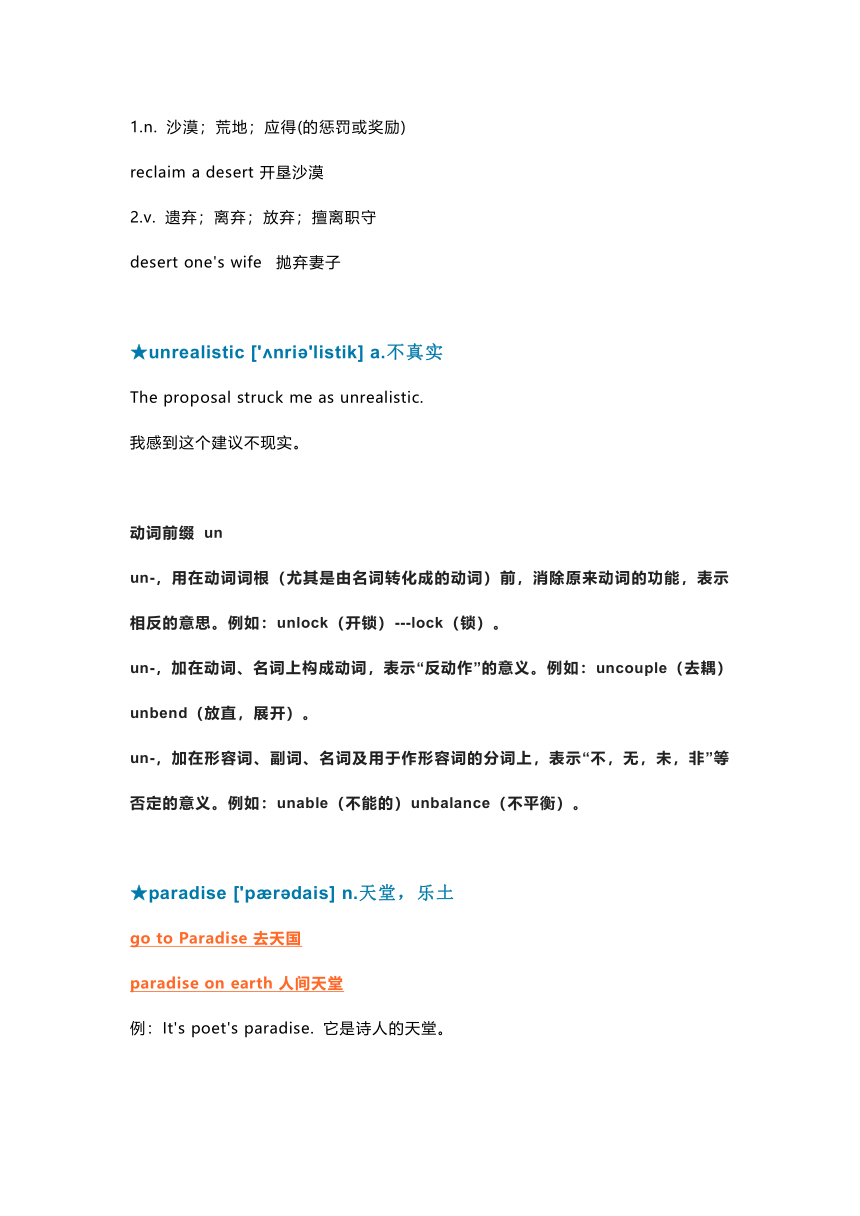
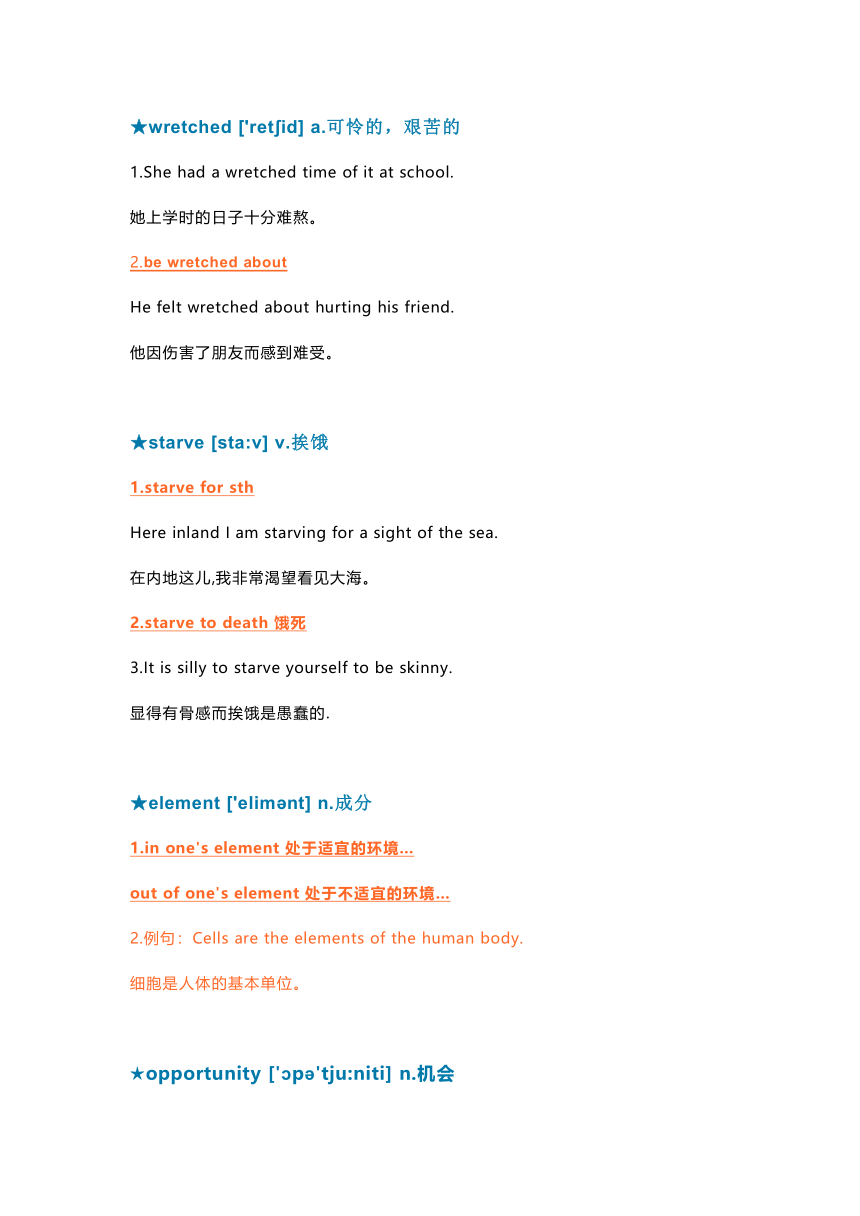
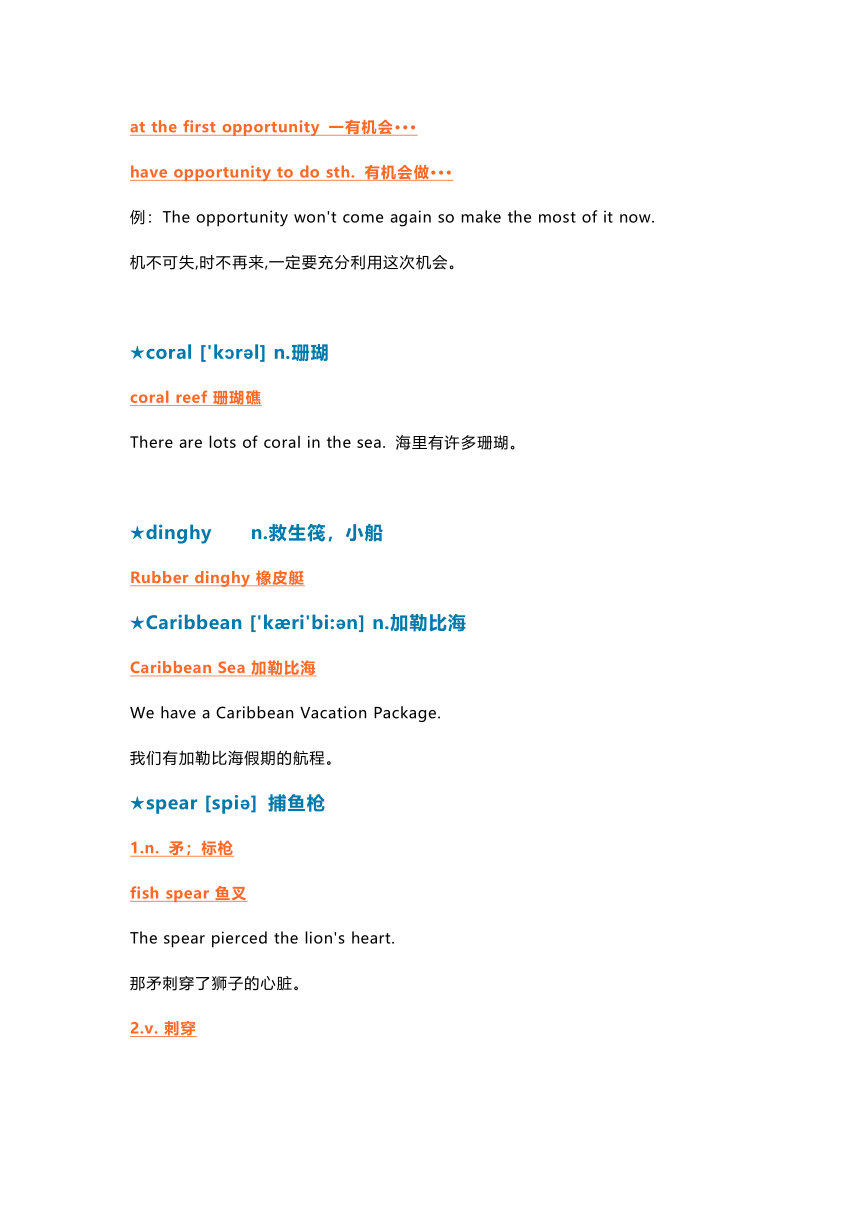
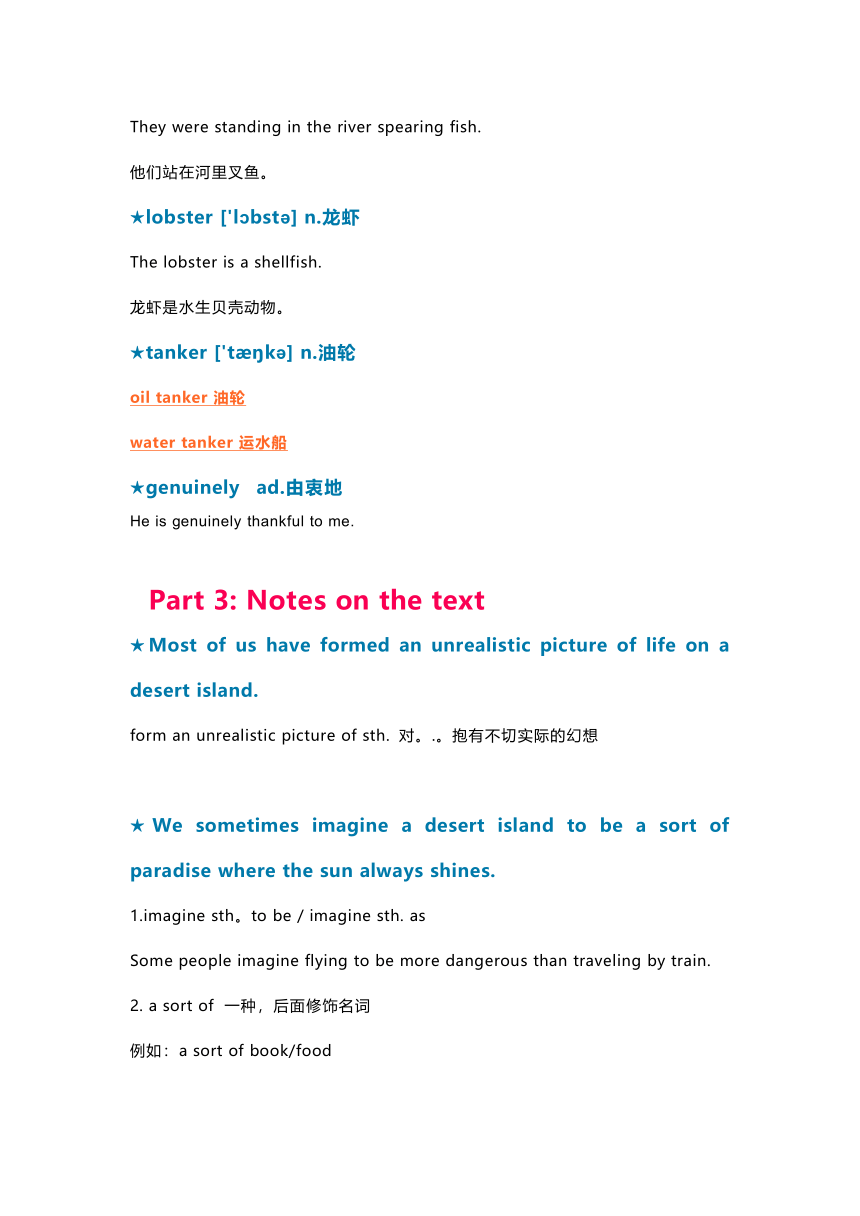
文档简介
Lesson 12 Life on a desert island
Part 1: Text
Most of us have formed an unrealistic picture of life on a desert island. We sometimes imagine a desert island to be a sort of paradise where the sun always shines. Life there is simple and good.
Ripe fruit falls from the trees and you never have to work. The other side of the picture is quite the opposite. Life on a desert island is wretched. You either starve to death or live like Robinson Crusoe, waiting for a boat which never comes. Perhaps there is an element of truth in both these pictures, but few of us have had the opportunity to find out.
Two men who recently spent five days on a coral island wished they had stayed there longer. They were taking a badly damaged boat from the Virgin Islands to Miami to have it repaired. During the journey, their boat began to sink. They quickly loaded a small rubber dinghy with food, matches, and tins of beer and rowed for a few miles across the Caribbean until they arrived at a tiny coral island. There were hardly any trees on the island and there was no water, but this did not prove to be a problem. The men collected rain-water in the rubber dinghy. As they had brought a spear gun with them, they had plenty to eat. They caught lobster and fish every day, and, as one of them put it 'ate like kings'. When a passing tanker rescued them five days later, both men were genuinely sorry that they had to leave.
Part 2: New words and expressions
1.desert ['dez t, di'z :t] v.(军队中)开小差
2.unrealistic [' nri 'listik] a.不真实的
3.paradise ['p r dais] n.天堂,乐土
4.wretched ['ret id] a.可怜的,艰苦的
5.starve [sta:v] v.挨饿
6.element ['elim nt] n.成分
7.opportunity [' p 'tju:niti] n.机会
8.coral ['k r l] n.珊瑚
9.Virgin ['v :d in] 维尔京群岛
10.Miami [mai' mi] n.迈阿密(美国最南的城市)
11.dinghy n.救生筏,小船
12.Caribbean ['k ri'bi: n] n.加勒比海
13.spear [spi ] 捕鱼枪
14.lobster ['l bst ] n.龙虾
15.tanker ['t k ] n.油轮
16.genuinely ad.由衷地
17.Robinson Crusoe 鲁滨孙·克鲁索(《鲁滨孙漂流记》主人公)
★desert ['dez t, di'z :t] v.(军队中)开小差
1.n. 沙漠;荒地;应得(的惩罚或奖励)
reclaim a desert 开垦沙漠
2.v. 遗弃;离弃;放弃;擅离职守
desert one's wife 抛弃妻子
★unrealistic [' nri 'listik] a.不真实
The proposal struck me as unrealistic.
我感到这个建议不现实。
动词前缀 un
un-,用在动词词根(尤其是由名词转化成的动词)前,消除原来动词的功能,表示相反的意思。例如:unlock(开锁)---lock(锁)。
un-,加在动词、名词上构成动词,表示“反动作”的意义。例如:uncouple(去耦)unbend(放直,展开)。
un-,加在形容词、副词、名词及用于作形容词的分词上,表示“不,无,未,非”等否定的意义。例如:unable(不能的)unbalance(不平衡)。
★paradise ['p r dais] n.天堂,乐土
go to Paradise 去天国
paradise on earth 人间天堂
例:It's poet's paradise. 它是诗人的天堂。
★wretched ['ret id] a.可怜的,艰苦的
1.She had a wretched time of it at school.
她上学时的日子十分难熬。
2.be wretched about
He felt wretched about hurting his friend.
他因伤害了朋友而感到难受。
★starve [sta:v] v.挨饿
1.starve for sth
Here inland I am starving for a sight of the sea.
在内地这儿,我非常渴望看见大海。
2.starve to death 饿死
3.It is silly to starve yourself to be skinny.
显得有骨感而挨饿是愚蠢的.
★element ['elim nt] n.成分
1.in one's element 处于适宜的环境...
out of one's element 处于不适宜的环境...
2.例句:Cells are the elements of the human body.
细胞是人体的基本单位。
★opportunity [' p 'tju:niti] n.机会
at the first opportunity 一有机会···
have opportunity to do sth. 有机会做···
例:The opportunity won't come again so make the most of it now.
机不可失,时不再来,一定要充分利用这次机会。
★coral ['k r l] n.珊瑚
coral reef 珊瑚礁
There are lots of coral in the sea. 海里有许多珊瑚。
★dinghy n.救生筏,小船
Rubber dinghy 橡皮艇
★Caribbean ['k ri'bi: n] n.加勒比海
Caribbean Sea 加勒比海
We have a Caribbean Vacation Package.
我们有加勒比海假期的航程。
★spear [spi ] 捕鱼枪
1.n. 矛;标枪
fish spear 鱼叉
The spear pierced the lion's heart.
那矛刺穿了狮子的心脏。
2.v. 刺穿
They were standing in the river spearing fish.
他们站在河里叉鱼。
★lobster ['l bst ] n.龙虾
The lobster is a shellfish.
龙虾是水生贝壳动物。
★tanker ['t k ] n.油轮
oil tanker 油轮
water tanker 运水船
★genuinely ad.由衷地
He is genuinely thankful to me.
Part 3: Notes on the text
★Most of us have formed an unrealistic picture of life on a desert island.
form an unrealistic picture of sth. 对。.。抱有不切实际的幻想
★We sometimes imagine a desert island to be a sort of paradise where the sun always shines.
1.imagine sth。to be / imagine sth. as
Some people imagine flying to be more dangerous than traveling by train.
2. a sort of 一种,后面修饰名词
例如:a sort of book/food
★The other side of the picture is quite the opposite. Life on a desert island is wretched. You either starve to death or live like Robinson Crusoe, waiting for a boat which never comes.
on one side,on the other hand 一方面,另一方面
quite the opposite 恰恰相反
either····or 或者·····或者······
Either you or I am going to the party. 谓语动词和最接近的主语保持一致.
★Perhaps there is an element of truth in both these pictures, but few of us have had the opportunity to find out.
1. an e lement of truth= a bit of truth
2. have the opportunity to do sth. 有机会做某事
3. find out 证实
★Two men who recently spent five days on a coral island wished they had stayed there longer.
1.spend five days on····· 在某地度过5天
2.wish做谓语动词,其后的宾语从句中要使用虚拟语气;虚拟语气的结构形式取决于所表达的实际情况:
1)如果表达对现在的遗憾或与现在相反的情况,that从句中的动词要采用过去时,be 动词要用were
I wish you could drive a car。
2)如果表达对过去的遗憾或与过去相反的情况,that从句中的动词要采用过去完成时
I wish I hadn’t spent so much money.
I wish that you had written to him.
3.)如果表达与将来事实相反或将来不可能实现的心愿,that从句中要使用would, could等情态动词的过去时
I wish that I could go abroad tomorrow.
I wish that you could come here tomorrow.
★They quickly loaded a small rubber dinghy with food, matches, and tins of beer and rowed for a few miles across the Caribbean until they arrived at a tiny coral island. There were hardly any trees on the island and there was no water, but this did not prove to be a problem.
1. load with 把····装载到·····
The workers are loading the truck with goods.
2. arrive at 到达(加小地点)
arrive in 到达(大地点)
3. hardly any= very little
Hardly anybody likes him becaues he is so rude.
4. prove to be= turn out to be
Part 4: Grammar&Difficult points
wish和if only
wish和if only用于谈论我们希望在现在或过去有所不同的事物,if only通常比wish更强烈一些。
在现在: wish/if only + 过去形式用于谈论我们希望有所不同的现在的状况。
e.g.:
1) I wish you didn’t live so far away.
2) If only we knew what to do.
3) He wishes he could afford a holiday.
在过去: wish/if only + 过去完成时用于谈论我们希望改变事物的过去。
e.g.:
1) They wish they hadn’t eaten so much chocolate. They’re feeling very sick now.
2) If only I’d studied harder when I was at school.
表达不满:wish + would(n’t)用于表示对某人或某事物的不满或生气,经常带有不可能或不愿意的感觉。
e.g.:
1) I wish you wouldn’t borrow my clothes without asking.
2) I wish it would rain. The garden really needs some water.
3) She wishes he’d work less. They never spend any time together.
Part 5: Homework
1.背诵lesson 1e单词&课文(重点语句解析需背诵)
2.Retell the text
3.练习总结课文
Part 1: Text
Most of us have formed an unrealistic picture of life on a desert island. We sometimes imagine a desert island to be a sort of paradise where the sun always shines. Life there is simple and good.
Ripe fruit falls from the trees and you never have to work. The other side of the picture is quite the opposite. Life on a desert island is wretched. You either starve to death or live like Robinson Crusoe, waiting for a boat which never comes. Perhaps there is an element of truth in both these pictures, but few of us have had the opportunity to find out.
Two men who recently spent five days on a coral island wished they had stayed there longer. They were taking a badly damaged boat from the Virgin Islands to Miami to have it repaired. During the journey, their boat began to sink. They quickly loaded a small rubber dinghy with food, matches, and tins of beer and rowed for a few miles across the Caribbean until they arrived at a tiny coral island. There were hardly any trees on the island and there was no water, but this did not prove to be a problem. The men collected rain-water in the rubber dinghy. As they had brought a spear gun with them, they had plenty to eat. They caught lobster and fish every day, and, as one of them put it 'ate like kings'. When a passing tanker rescued them five days later, both men were genuinely sorry that they had to leave.
Part 2: New words and expressions
1.desert ['dez t, di'z :t] v.(军队中)开小差
2.unrealistic [' nri 'listik] a.不真实的
3.paradise ['p r dais] n.天堂,乐土
4.wretched ['ret id] a.可怜的,艰苦的
5.starve [sta:v] v.挨饿
6.element ['elim nt] n.成分
7.opportunity [' p 'tju:niti] n.机会
8.coral ['k r l] n.珊瑚
9.Virgin ['v :d in] 维尔京群岛
10.Miami [mai' mi] n.迈阿密(美国最南的城市)
11.dinghy n.救生筏,小船
12.Caribbean ['k ri'bi: n] n.加勒比海
13.spear [spi ] 捕鱼枪
14.lobster ['l bst ] n.龙虾
15.tanker ['t k ] n.油轮
16.genuinely ad.由衷地
17.Robinson Crusoe 鲁滨孙·克鲁索(《鲁滨孙漂流记》主人公)
★desert ['dez t, di'z :t] v.(军队中)开小差
1.n. 沙漠;荒地;应得(的惩罚或奖励)
reclaim a desert 开垦沙漠
2.v. 遗弃;离弃;放弃;擅离职守
desert one's wife 抛弃妻子
★unrealistic [' nri 'listik] a.不真实
The proposal struck me as unrealistic.
我感到这个建议不现实。
动词前缀 un
un-,用在动词词根(尤其是由名词转化成的动词)前,消除原来动词的功能,表示相反的意思。例如:unlock(开锁)---lock(锁)。
un-,加在动词、名词上构成动词,表示“反动作”的意义。例如:uncouple(去耦)unbend(放直,展开)。
un-,加在形容词、副词、名词及用于作形容词的分词上,表示“不,无,未,非”等否定的意义。例如:unable(不能的)unbalance(不平衡)。
★paradise ['p r dais] n.天堂,乐土
go to Paradise 去天国
paradise on earth 人间天堂
例:It's poet's paradise. 它是诗人的天堂。
★wretched ['ret id] a.可怜的,艰苦的
1.She had a wretched time of it at school.
她上学时的日子十分难熬。
2.be wretched about
He felt wretched about hurting his friend.
他因伤害了朋友而感到难受。
★starve [sta:v] v.挨饿
1.starve for sth
Here inland I am starving for a sight of the sea.
在内地这儿,我非常渴望看见大海。
2.starve to death 饿死
3.It is silly to starve yourself to be skinny.
显得有骨感而挨饿是愚蠢的.
★element ['elim nt] n.成分
1.in one's element 处于适宜的环境...
out of one's element 处于不适宜的环境...
2.例句:Cells are the elements of the human body.
细胞是人体的基本单位。
★opportunity [' p 'tju:niti] n.机会
at the first opportunity 一有机会···
have opportunity to do sth. 有机会做···
例:The opportunity won't come again so make the most of it now.
机不可失,时不再来,一定要充分利用这次机会。
★coral ['k r l] n.珊瑚
coral reef 珊瑚礁
There are lots of coral in the sea. 海里有许多珊瑚。
★dinghy n.救生筏,小船
Rubber dinghy 橡皮艇
★Caribbean ['k ri'bi: n] n.加勒比海
Caribbean Sea 加勒比海
We have a Caribbean Vacation Package.
我们有加勒比海假期的航程。
★spear [spi ] 捕鱼枪
1.n. 矛;标枪
fish spear 鱼叉
The spear pierced the lion's heart.
那矛刺穿了狮子的心脏。
2.v. 刺穿
They were standing in the river spearing fish.
他们站在河里叉鱼。
★lobster ['l bst ] n.龙虾
The lobster is a shellfish.
龙虾是水生贝壳动物。
★tanker ['t k ] n.油轮
oil tanker 油轮
water tanker 运水船
★genuinely ad.由衷地
He is genuinely thankful to me.
Part 3: Notes on the text
★Most of us have formed an unrealistic picture of life on a desert island.
form an unrealistic picture of sth. 对。.。抱有不切实际的幻想
★We sometimes imagine a desert island to be a sort of paradise where the sun always shines.
1.imagine sth。to be / imagine sth. as
Some people imagine flying to be more dangerous than traveling by train.
2. a sort of 一种,后面修饰名词
例如:a sort of book/food
★The other side of the picture is quite the opposite. Life on a desert island is wretched. You either starve to death or live like Robinson Crusoe, waiting for a boat which never comes.
on one side,on the other hand 一方面,另一方面
quite the opposite 恰恰相反
either····or 或者·····或者······
Either you or I am going to the party. 谓语动词和最接近的主语保持一致.
★Perhaps there is an element of truth in both these pictures, but few of us have had the opportunity to find out.
1. an e lement of truth= a bit of truth
2. have the opportunity to do sth. 有机会做某事
3. find out 证实
★Two men who recently spent five days on a coral island wished they had stayed there longer.
1.spend five days on····· 在某地度过5天
2.wish做谓语动词,其后的宾语从句中要使用虚拟语气;虚拟语气的结构形式取决于所表达的实际情况:
1)如果表达对现在的遗憾或与现在相反的情况,that从句中的动词要采用过去时,be 动词要用were
I wish you could drive a car。
2)如果表达对过去的遗憾或与过去相反的情况,that从句中的动词要采用过去完成时
I wish I hadn’t spent so much money.
I wish that you had written to him.
3.)如果表达与将来事实相反或将来不可能实现的心愿,that从句中要使用would, could等情态动词的过去时
I wish that I could go abroad tomorrow.
I wish that you could come here tomorrow.
★They quickly loaded a small rubber dinghy with food, matches, and tins of beer and rowed for a few miles across the Caribbean until they arrived at a tiny coral island. There were hardly any trees on the island and there was no water, but this did not prove to be a problem.
1. load with 把····装载到·····
The workers are loading the truck with goods.
2. arrive at 到达(加小地点)
arrive in 到达(大地点)
3. hardly any= very little
Hardly anybody likes him becaues he is so rude.
4. prove to be= turn out to be
Part 4: Grammar&Difficult points
wish和if only
wish和if only用于谈论我们希望在现在或过去有所不同的事物,if only通常比wish更强烈一些。
在现在: wish/if only + 过去形式用于谈论我们希望有所不同的现在的状况。
e.g.:
1) I wish you didn’t live so far away.
2) If only we knew what to do.
3) He wishes he could afford a holiday.
在过去: wish/if only + 过去完成时用于谈论我们希望改变事物的过去。
e.g.:
1) They wish they hadn’t eaten so much chocolate. They’re feeling very sick now.
2) If only I’d studied harder when I was at school.
表达不满:wish + would(n’t)用于表示对某人或某事物的不满或生气,经常带有不可能或不愿意的感觉。
e.g.:
1) I wish you wouldn’t borrow my clothes without asking.
2) I wish it would rain. The garden really needs some water.
3) She wishes he’d work less. They never spend any time together.
Part 5: Homework
1.背诵lesson 1e单词&课文(重点语句解析需背诵)
2.Retell the text
3.练习总结课文
同课章节目录
